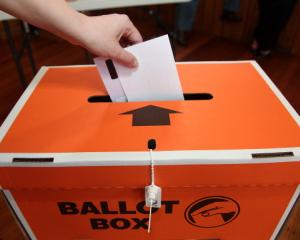Otago has fought to save government services in the region but has witnessed the closure of Hillside through the Government failing to introduce some sort of national procurement programme.
New Zealand Post centralised its South Island region on the earthquake-damaged city of Christchurch as the Government sought to shore up voter support in the wake of a slow rebuild.
AgResearch may yet be forced to rethink its business plan for the Invermay facility but a lot of the damage has been done already.
South Island operations for Invermay were to be centred on Lincoln University, for various reasons - none of which met favour in the South.
Economic Development Minister Steven Joyce had been warned repeatedly the tide was turning for National in the regions but had consistently ignored protestations, remaining convinced he, and Mr Key, knew best.
Enter New Zealand First leader Winston Peters in the Northland by-election, and the political landscape has changed.
Mr Peters has throughout his career been a target for the protest vote.
He has promoted his image as a rebel since he was first elected in 1978 when the late Sir Rob Muldoon was at the helm of the National Party.
If there is one lesson Mr Peters learned through his long-time canvassing is smaller centres welcome attention from politicians.
After being thrown out of Parliament by voters in 2008, Mr Peters spent three years touring New Zealand, visiting town halls and community centres the length and breadth of the country.
New Zealand First returned to Parliament in 2011.
Mr Peters now holds an important role in how the next two years of Parliament will play out.
Already, he is playing mind games about whether New Zealand First will bring in another MP now he has resigned as a list MP.
If the party does bring in an extra MP, the Government faces some very difficult legislative challenges ahead.
Mr Peters has strong views on monetary policy and the role of the Reserve Bank.
He wants more intervention on the currency to protect exporters.
In short, Mr Peters is a remnant from the Muldoon area of controlled markets.
If one thing became apparent during last year's election campaign it was that Messrs Key and Joyce were paying lip service to the regions.
Gone were the days of chats to local media.
The campaign was driven by national network coverage with a carefully crafted message for the voting masses.
To be fair, 1.13 million New Zealanders voted for National at the last election and the party deserves to be in government given only 1.12 million voted for the other parties represented in Parliament.
Strangely, Mr Peter's by-election victory plays into the hands of lone United Future MP Peter Dunne, who dismissed New Zealand First as irrelevant in a short press release.
Mr Dunne holds on to his seat solely because National does not put up a candidate.
He opposes some of the Government's proposed changes to resource management legislation and will now play a hand much stronger than he deserves when Parliament resumes.
Mr Joyce has promised National will learn from the defeat in Northland, but it will take a major shift for National's Cabinet to change habits of the past six years.
For one thing, it is still not clear why the by-election needed to be called because no details of the allegations surrounding former Northland MP Mike Sabin have been released.
And Mr Key has not said when he knew of any trouble brewing for Mr Sabin.
Was it before the general election?
And if so, why carry on the charade, forcing a by-election on the former blue stronghold?
Voters in the electorate have a right to know.
The Government needs to be careful it does not become further accused of arrogance.
It tried to bribe its way into Northland with an extensive spending programme for new bridges.
Voters not just in Northland but throughout New Zealand saw through the shallowness of the gesture.
It is now up to the party to show respect for the rest of the country.












